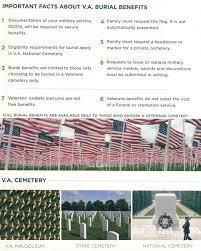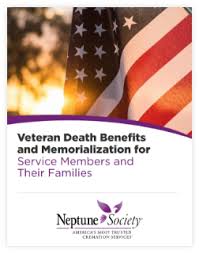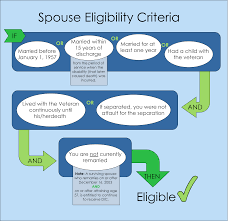VA Funeral Benefits: Honoring Those Who Served
When a veteran or an eligible family member passes away, the Department of Veterans Affairs (VA) offers a range of funeral benefits to honor their service and provide support during a difficult time. These benefits not only help alleviate the financial burden associated with funeral expenses but also ensure that veterans receive the recognition they deserve.
One of the most significant benefits provided by the VA is burial in a national cemetery. This includes a gravesite, opening and closing of the grave, perpetual care, a government headstone or marker, and a burial flag. The serene beauty and historical significance of these national cemeteries create a fitting resting place for those who have served our nation.
In addition to burial benefits, the VA also provides monetary assistance for funeral expenses. Eligible veterans may receive a burial allowance to cover costs such as transportation of remains, preparation and embalming, casket or urn expenses, and even some transportation costs for family members attending the funeral. The amount of this allowance varies depending on whether the veteran’s death was service-related or not.
Furthermore, surviving spouses or dependents of veterans may be eligible for additional benefits. These can include reimbursement for transportation expenses if the burial takes place in a private cemetery rather than a national cemetery. The VA may also provide an allowance for plot interment if the veteran is buried in a non-VA cemetery.
To access these benefits, it is important to contact your nearest VA regional office as soon as possible after the veteran’s passing. They will guide you through the application process and help determine eligibility based on specific criteria such as discharge status and length of service.
It is worth noting that funeral benefits are just one aspect of what the VA offers to honor veterans’ service. They also provide grief counseling services, memorial items such as Presidential Memorial Certificates, and even assistance with obtaining military records for families seeking closure or historical documentation.
The VA funeral benefits program is a testament to our nation’s commitment to honoring those who have served. It ensures that veterans and their families receive the support they need during a challenging time, while also providing a lasting tribute to their sacrifice.
As we remember and honor our veterans, it is essential to spread awareness about these benefits. By sharing this information with friends, family members, and fellow veterans, we can ensure that those who have served are aware of the resources available to them and their loved ones.
In conclusion, the VA funeral benefits program serves as a compassionate gesture towards those who dedicated their lives to protecting our freedom. It provides financial assistance and support during an emotionally difficult time while ensuring that our veterans receive the recognition they deserve. Let us continue to honor and remember those who have served by spreading awareness of these invaluable benefits.
Frequently Asked Questions About VA Funeral Benefits: A Comprehensive Guide
- How do I apply for VA funeral benefits?
- What are the eligibility requirements for VA funeral benefits?
- What documents do I need to submit in order to receive VA funeral benefits?
- How much money can I receive from VA funeral benefits?
- Are there any restrictions on how the money from VA funeral benefits can be used?
- How long does it take to process a claim for VA funeral benefits?
How do I apply for VA funeral benefits?
To apply for VA funeral benefits, follow these steps:
- Contact the nearest VA regional office: Reach out to your local VA regional office as soon as possible after the veteran’s passing. You can find contact information for your nearest office on the VA’s official website or by calling their toll-free number.
- Gather necessary documents: Prepare the required documentation before contacting the VA. This typically includes the veteran’s discharge papers (DD-214), death certificate, and any funeral expense receipts you may have incurred.
- Schedule an appointment: Request an appointment with a VA representative to discuss funeral benefits. This appointment can be conducted in person or over the phone, depending on your preference and circumstances.
- Provide necessary information: During the appointment, you will need to provide information about the deceased veteran, such as their full name, Social Security number, military service details, and details of any insurance policies they may have had.
- Complete the application: The VA representative will guide you through the application process and assist you in completing all necessary paperwork. They will also inform you about any additional documentation that may be required based on your specific situation.
- Await a decision: After submitting your application, it typically takes a few weeks for the VA to process it and make a decision regarding eligibility for funeral benefits. You can inquire about the status of your application by contacting your assigned VA representative or checking online through their official website.
- Receive benefits: If approved, you will receive notification from the VA detailing the funeral benefits you are eligible to receive. This may include burial in a national cemetery, financial assistance for funeral expenses, headstones or markers, burial flags, and other applicable benefits.
Remember that every situation is unique, and eligibility requirements may vary based on factors such as service-related deaths or specific circumstances surrounding the veteran’s service record. It is crucial to communicate openly with your assigned VA representative throughout this process to ensure all necessary information is provided and to address any questions or concerns you may have.
By following these steps and working closely with the VA, you can navigate the application process for funeral benefits and receive the support your loved one deserves.
What are the eligibility requirements for VA funeral benefits?
To be eligible for VA funeral benefits, the deceased individual must have been a veteran who was discharged under conditions other than dishonorable. The eligibility requirements vary depending on the specific benefit being sought. Here are some key eligibility criteria:
Burial in a National Cemetery:
– The veteran must have served on active duty and completed the required period of service.
– Certain Reserve and National Guard members may also be eligible.
– Spouses and dependent children may also be eligible for burial in a national cemetery.
Burial Allowance:
– The veteran’s death must not have been due to dishonorable conduct during military service.
– The veteran must have been receiving VA pension or compensation at the time of their passing, or they must have been entitled to receive it if they were not receiving retirement pay.
Transportation Allowance:
– The veteran’s death must be service-related, or they should have been receiving VA pension or compensation at the time of their passing, or they would have been entitled to it if they were not receiving retirement pay.
– In cases where the burial is in a private cemetery, transportation expenses may be reimbursed for certain individuals.
It is important to note that these eligibility requirements are general guidelines, and there may be additional criteria specific to each benefit. It is recommended to contact the nearest VA regional office or visit the official VA website for more detailed information regarding eligibility and application procedures.
The VA funeral benefits program aims to provide support and recognition to veterans and their families during a difficult time. By understanding the eligibility requirements, individuals can determine if they qualify for these valuable benefits that honor their service and sacrifice.
What documents do I need to submit in order to receive VA funeral benefits?
To receive VA funeral benefits, certain documents are typically required to establish eligibility and process the claim. While the specific documents may vary depending on individual circumstances, here are some commonly requested items:
- Discharge Papers (DD-214): This document proves the veteran’s military service and includes information such as dates of service, rank, and type of discharge. If the DD-214 is not available, alternative forms like the DD-215 or NGB Form 22 can be used.
- Death Certificate: A certified copy of the veteran’s death certificate is necessary to verify their passing. It should include relevant details such as cause of death, date, and location.
- Marriage Certificate: If applicable, a marriage certificate is required to establish eligibility for certain benefits for surviving spouses.
- Birth Certificate: The birth certificate of the deceased veteran may be needed to verify their age and citizenship.
- Social Security Numbers: The social security numbers of both the deceased veteran and any surviving family members applying for benefits are typically required.
- Funeral Home Invoice: To claim reimbursement for funeral expenses, you will need an itemized invoice from the funeral home detailing all costs incurred during funeral arrangements.
- Proof of Payment: Documentation demonstrating that funeral expenses have been paid or proof of financial responsibility is often necessary for reimbursement claims.
- Power of Attorney (if applicable): If someone other than a surviving spouse or dependent child is handling the application process on behalf of the family, a power of attorney document may be required.
It’s important to note that these are general guidelines, and additional documentation may be requested based on individual circumstances or specific benefit claims. To ensure a smooth process, it is recommended to contact your nearest VA regional office or visit their official website for comprehensive information regarding required documents specific to your situation.
By gathering all necessary documentation in advance, you can expedite your application process and ensure that you receive the VA funeral benefits you are entitled to.
How much money can I receive from VA funeral benefits?
The amount of money you can receive from VA funeral benefits depends on various factors, including whether the veteran’s death was service-related or not. Here is a general overview of the burial and funeral allowances provided by the Department of Veterans Affairs (VA):
1. Service-Related Death: If the veteran’s death was determined to be service-related, the VA offers a burial allowance of up to $2,000. In addition to this allowance, there may be additional reimbursements for transportation expenses and plot interment if the veteran is buried in a non-VA cemetery.
2. Non-Service-Related Death: For veterans who passed away due to causes unrelated to their military service, the VA provides a burial allowance of up to $300. This amount can be increased if the veteran was hospitalized by the VA at the time of their passing or if they were receiving a VA pension or compensation.
It’s important to note that these amounts are subject to change, and specific circumstances may affect eligibility and benefit amounts. To get accurate information regarding your individual case and potential benefits, it is recommended to contact your nearest VA regional office or visit their official website.
The VA funeral benefits program aims to provide financial assistance and support during a difficult time for veterans’ families. By reaching out to the VA and providing them with necessary documentation, you can inquire about your eligibility and receive guidance on how to access these benefits.
Are there any restrictions on how the money from VA funeral benefits can be used?
Yes, there are some restrictions on how the money from VA funeral benefits can be used. The funds provided by the VA for funeral expenses are intended to cover specific costs related to the veteran’s burial or cremation. These costs may include transportation of remains, preparation and embalming, casket or urn expenses, and other related services.
It is important to note that the VA burial allowance is not intended to cover all funeral expenses in their entirety. If there are additional costs beyond what the VA provides, such as flowers, obituary notices, or catering services, those expenses would typically need to be covered by the family or through other means.
Furthermore, it is essential to keep in mind that the specific amount of the burial allowance may vary depending on whether the veteran’s death was service-related or not. Service-related deaths generally provide a higher allowance compared to non-service-related deaths.
To ensure proper use of the funds and compliance with VA regulations, it is advisable to work closely with your funeral director and communicate any questions or concerns you may have regarding eligible expenses. They can help guide you through the process and provide clarity on what costs can be covered by the VA funeral benefits.
Remember that transparency and open communication with your funeral director and the VA regional office will help ensure that you utilize the benefits appropriately while honoring your loved one’s memory within the guidelines set forth by the Department of Veterans Affairs.
How long does it take to process a claim for VA funeral benefits?
The processing time for a claim for VA funeral benefits can vary depending on various factors. Generally, the VA aims to process claims within 30 days from the date they receive all required documentation. However, it’s important to note that more complex cases or situations that require additional information may take longer.
To ensure a smoother and quicker processing time, it is crucial to provide all necessary documentation when submitting the claim. This includes proof of the veteran’s military service, discharge papers (DD-214), death certificate, and any other relevant documents requested by the VA.
To expedite the process, it is recommended to contact your local VA regional office or a Veterans Service Organization (VSO) for assistance in preparing and submitting the claim. These organizations have experience in navigating the system and can provide guidance on gathering the necessary documentation.
Remember that each case is unique, and processing times can vary. It’s advisable to stay in touch with the VA or your VSO for updates on your claim’s status. They can provide you with more specific information based on your circumstances and help address any concerns or questions you may have during the process.
While waiting for the claim to be processed, it’s essential to keep track of any expenses related to funeral arrangements. This will help ensure accurate reimbursement once the claim is approved.
Overall, while there is no definitive timeline for processing a claim for VA funeral benefits, providing complete and accurate documentation from the start can help expedite the process and ensure a timely response from the VA.



